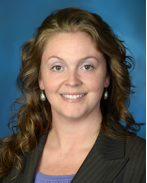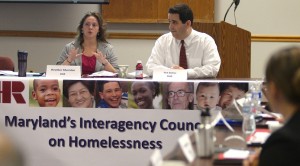 Heather Sheridan is a graduate of the M.A program in Urban Policy Analysis and Management at The New School. She has extensive experience in working on programs that address the needs of formerly homeless and low-income residents. Prior to Milano the foundation of her career was in community organizing and public policy work on a number of issues affecting low-income communities around the nation. Upon graduation from The New School she began working with Common Ground, a successful supportive housing developer in New York City. Most recently, Heather has taken a position as the Director of Homeless Services with the Department of Human Resources for the State of Maryland.
Heather Sheridan is a graduate of the M.A program in Urban Policy Analysis and Management at The New School. She has extensive experience in working on programs that address the needs of formerly homeless and low-income residents. Prior to Milano the foundation of her career was in community organizing and public policy work on a number of issues affecting low-income communities around the nation. Upon graduation from The New School she began working with Common Ground, a successful supportive housing developer in New York City. Most recently, Heather has taken a position as the Director of Homeless Services with the Department of Human Resources for the State of Maryland.
What led you to pursue a Master of Urban Policy Analysis at the New School?
When I decided to pursue my master’s, I wanted to go to a school where people felt a connection and calling to change the world. I remember reading “change agent” on the website for Milano and I just had a really strong connection to the purpose of the school. I knew I would be studying with other people who felt a similar calling as I have all my life. My mother taught me to follow issues I feel passionate about and taught me that no matter what I decided to do, as long as I felt passionately about it and believed in it, it is always the right thing. That advice has allowed me to work on a variety of issues and causes that I believe in and feel strongly about. It was the most valuable thing she could have taught me. The thought of moving to such a large city overwhelmed me a bit, but I was excited to be surrounded by other students who were open to the idea of change and we were not scared to declare that in fact, THAT is what we were on this earth to do.
Upon graduating from the Urban Policy Analysis program you begin work at Common Ground. What were your job responsibilities while working there?
I was the Building Director for the Prince George site (located at 14 East 28th street, Manhattan), the second largest site in the Common Ground portfolio, housing 414 formerly homeless and low-income tenants. Support services are provided onsite by the Center for Urban Community Services (CUCS) a partner with Common Ground. Staff supported clients transitioning from the streets and other temporary housing situations to move towards self-sufficiency. I also managed one of two transitional housing programs offered by Common Ground. As Program Director of the Andrews (located at 197 Bowery, Manhattan), I directed all administrative, programmatic and clinical aspects of this innovative transitional housing site for 146 chronically street homeless clients.
You’ve recently taken a position as Director of Homeless Services for the Department of Human Resources (DHR) in Maryland. What are your primary duties?
Nationally, there are over 600,000 homeless people living in the nation and about 10,000 of those are living in Maryland. In my role as the Director of Homeless Services, I am responsible for organizing and facilitating the outcomes of Maryland’s Interagency Council on Homelessness (ICH). The ICH brings together leaders from state agencies, providers and advocates to collaboratively address the causes of homelessness, the needs of those who are homeless and will determine multi-tiered solutions to homelessness for our state. I am also responsible for over $5,000,000 in grant money distributed from DHR to support the work of providers throughout the 24 jurisdictions of Maryland, serving the homeless. I am also very committed to developing policy and housing solutions for the growing numbers or homeless youth or those at risk of becoming homeless.
What do you see as the major problems in providing beneficial services to those facing housing insecurities in Maryland?
The cost of housing nationally is on the rise, however wages have not increased at the same pace. We are all a paycheck or significant life event away from becoming homeless and although many of us have the ability to lean on family members or friends to get though, many people do not. These issues are not specific only to Maryland, but a lack of resources are always a challenge in this field. When someone is homeless, providing them with a home is not the only answer. In order to ensure someone can move from homelessness on to self-sufficiency, it is imperative that services are offered and that those services meet the clients where they are in their spectrum of need. Some areas in our state do not have traditional shelters as there are in New York. Some of the smaller jurisdictions can only afford to provide emergency shelter beds when the months are the coldest. DHR provides a series of grants to our local jurisdictions that can help clients preserve their current housing location, which if possible is always best. The challenge is if someone has lost their housing, to find affordable housing that they can keep on their own. Also, matching them up with job training opportunities that will lead to a job that provides a livable wage, all things states struggle with. Our providers do an excellent job making limited resources stretch to support our most vulnerable. It’s always our challenge to be as creative and innovative in utilizing existing resources in a way that best serves this evolving population. When I ran programs for Common Ground, I learned through that work, that homelessness is usually a result of multiple support system failures affecting an individual and their own personal life circumstances. The way any jurisdiction helps our homeless is a reflection of how we recognize and intend to address these inadequacies. I believe that Maryland is always looking at this and my agency in particular through the work of the ICH will be doing even more of this on a state level.
You recently joined other state leaders in Los Angeles for a national meeting on homelessness. What were the outcomes of this meeting?
 This meeting was a convening of state leaders to advance shared goals of ending homelessness and was facilitated by the United States Interagency Council on Homelessness (USICH). USICH released their 10 year plan to end homelessness back in 2010, available here: http://usich.gov/opening_doors/ . The purpose of this meeting, the first of its kind was to bring state leaders together to share progress made thus far and to brainstorm other solutions available to solve the issue of homelessness. We discussed opportunities available through Medicaid expansion, which may present additional funding for support for this population once housed. We discussed successful solutions other states are executing around servicing youth populations who are falling into homelessness as well as how to better utilize existing affordable housing resources and set-aside programs for those who are veterans or have experienced homelessness.
This meeting was a convening of state leaders to advance shared goals of ending homelessness and was facilitated by the United States Interagency Council on Homelessness (USICH). USICH released their 10 year plan to end homelessness back in 2010, available here: http://usich.gov/opening_doors/ . The purpose of this meeting, the first of its kind was to bring state leaders together to share progress made thus far and to brainstorm other solutions available to solve the issue of homelessness. We discussed opportunities available through Medicaid expansion, which may present additional funding for support for this population once housed. We discussed successful solutions other states are executing around servicing youth populations who are falling into homelessness as well as how to better utilize existing affordable housing resources and set-aside programs for those who are veterans or have experienced homelessness.
What is one experience from your professional or master’s career that has been significant in developing you professionally?
I remember towards the end of my first year at Milano, our Finance lab team was meeting to discuss what internships we had planned to do for the summer. Before Milano, I prided myself in having steps planned out, sometimes two or three ahead. I liked to be prepared and coming to graduate school I thought I knew what was after, but as I sat there at the table, I had a mini moment of panic because I didn’t know exactly what I was going to do that summer. Despite the hesitancy to share this, I did share it with my group and our dean and professor at the time Lisa Servon. I explained that I typically have things planned out and used the metaphor of having stacks of paper organized just so in my brain and I felt like after my first year at Milano, someone had come in and turned a fan on and all of my nice stacks of paper had been blown all over and I felt very nervous because I didn’t have the next steps planned. She wisely responded that this was exactly where I should be at that stage of my life because it opens up a world of possibilities that I didn’t realize I had available. My first year of policy lab and finance lab opened me up to so many new issue areas and work opportunities and how better to face that summer without blinders of past plans and expectations and approach it with a fresh sense of opportunity. So now, when I have that feeling of my nice organized “stacks” of plans and then all of a sudden feel like someone turned on the fan, I recognize it as an opportunity to see things differently and approach the problem with a new perspective.
You have also conducted boot camp sessions at Milano that help prepare students to find jobs upon graduation. What advice do you give Milano students who will soon be looking for full time employment in your field or a similar field?
I share this with Boot Camp participants and I will share here, take a little time to figure out issues that you are passionate about. That is one of the many reasons our policy lab, finance lab and JP Morgan Chase [JP Morgan Chase paid internships no longer offered] opportunities are so valuable because they offer students the chance to learn more about issue areas that they may not have known about or gives them the opportunity to see things from a different perspective, all things important on the path to learning about your professional passions.




